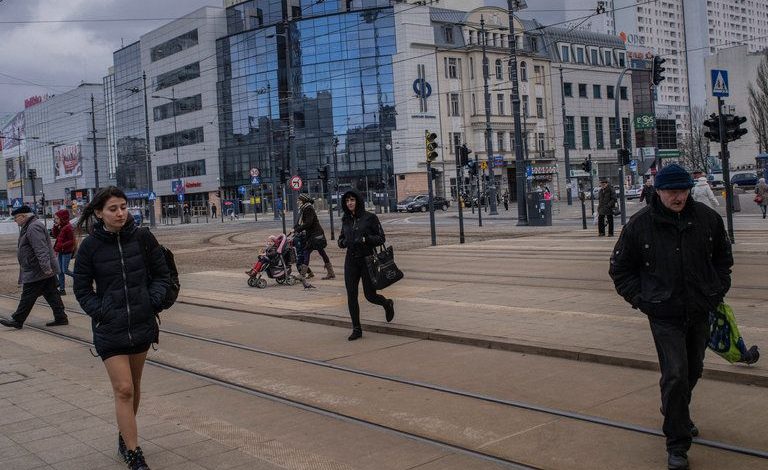Labor migration is not a threat, but a chance for Germany
On May 1, Germany lifts restrictions on labor migration from countries that joined the European Union in 2004. According to experts, up to 400000 people can move from Poland alone to earn money in Germany.
Free labor migration is one of the fundamental principles of the European Union. However, when in 2004 10 countries of Eastern, Southern and Central Europe became EU members, the “patriarchs” of the European Union were allowed temporarily – for a period of up to seven years, that is, until May 1, 2011 – not to allow citizens of Poland, Czech Republic to their labor markets, Hungary, Slovakia, Slovenia, Lithuania, Latvia and Estonia.
The transition period is over
Full freedom to go to the EU to earn money wherever the soul would wish was immediately received only by the inhabitants of Malta and the Greek part of Cyprus. True, not all EU old-timers took the opportunity to obstruct visitors. Great Britain, Ireland and Sweden did not begin to impose restrictions on labor migration from newcomer countries, and, as it turned out later, did the right thing.
A couple of years later, Spain, Portugal, Finland and Greece followed suit. Belgium, Denmark, France, the Netherlands and Luxembourg, in turn, created preferential conditions for many categories of “imported” workers.
Only Austria and Germany decided to exhaust the transition period until the last day. But from May 1, they will remove all restrictions from their labor markets, which causes some in Germany to fear the possible influx of cheap labor, in particular from Poland. In their opinion, the Poles will begin to supplant domestic workers. How reasonable are these concerns?
Mass exodus from Poland
Immediately after Poland joined the EU, mass emigration began. In a matter of months, about two million people left the country in search of earnings.
Katarzyna Danek, a Polish jobseeker abroad, said that after Britain and Ireland opened their labor markets, a real outcome began from Poland. But during this time all who wanted to have already left, so Danek does not expect any “mass flow” of Poles to Germany, especially since the FRG, according to her, has never been a particularly interesting direction for them.
This point of view is confirmed by Krzysztof Didushko, who already has experience in some EU countries. According to his observations, today they are only forced to leave Poland – those who cannot find work at home. Moreover, the economic benefit for them is very doubtful: you need to pay for travel, rent an apartment, transfer money to relatives in Poland. Having a good profession in Poland will easily find a well-paid job, Didushko said.
Waiting for Polish Migrants
Nevertheless, German language courses for adults have become in high demand this year in Poland. According to experts, between 100,000 and 400,000 Poles are potentially ready to withdraw from their homes and set off to seek work in Germany.
True, they, like migrants from other new EU countries, do not pose a threat to the German labor market, the Ursula von der Leyen, Minister for Labor and Social Security of Germany, is sure. “We do not have enough work, but at the present time – workers, and in the coming years the shortage of workers will become even greater,” the minister said. True, von der Leyen understands that people with low qualifications, that is, those employed in low-paid areas, experience certain concerns.
These fears, however, are in vain, because in many sectors of the national economy of Germany, the minister explained, tariff agreements are in force, and in others the minimum wages have been established by law, which does not allow entrepreneurs to pay for the services of labor migrants – construction workers, cleaners, nurses or nurses – at dumping prices.
Responsible persons do not see the threat in the federal state of Brandenburg, bordering Poland. Local labor minister Günter Baaske welcomes the removal of labor market restrictions as Brandenburg is in dire need of skilled workers. True, there is a shortage of such in Poland itself, so the leader of the union of German trade unions in eastern Brandenburg, Olaf Himmel, even fears that in the near future, if wages in Poland continue to increase, labor migration will go in the opposite direction – from west to east.
Not a threat, but a chance
However, for the time being, the potential influx of labor to Germany from Poland and other states that joined the EU in 2004 is a chance to accelerate economic development. This, in particular, is evidenced by the experience of Great Britain, which risked complete freedom of labor migration from the very beginning, Katarzyna Danek explained. “After the first shock,” she said, “the British realized that the influx of Polish migrants was beneficial: they occupied niches in which the British themselves did not want to work. In addition, thanks to the zeal of Polish migrants, many new jobs were created in the manufacturing sector that opened up new chances for the British themselves. “
Germany, according to the EU Commissioner for Employment, Laszlo Andor, can count on a similar effect. He said that it would be wiser for Germany to lift the restrictions earlier, because in conditions of a shortage of qualified personnel and an aging society, it needs an influx of labor from abroad. According to a recent survey conducted by the German Chamber of Commerce and Industry, 70% of German enterprises have difficulty finding suitable specialists to fill vacancies.
Some will suffer
And yet there is one category of employers in Germany that has well-founded fears, although it does not advertise them. These are families resorting to the still illegal work of nannies, cleaners or carers from the new EU countries.
The German-language newspapers in Germany are full of advertisements, primarily women from Latvia, Lithuania and Estonia, offering home cleaning services, caring for children, sick and elderly, housekeeping assistants. As citizens of one of the EU countries, they can legally be in Germany, but they work illegally, and for a minuscule fee – 5 – 7 euros per hour, or even less if they live and feed in the family.
In the “white” German labor market, such personnel are in short supply, and after May 1, Baltic women will be able to look for – and, of course, find – appropriate work on absolutely legal grounds. Their former employers will have to either do it on their own, or legalize the servant and pay her the minimum wage established by law.
This post is also available in:
 English
English  Русский (Russian)
Русский (Russian)






